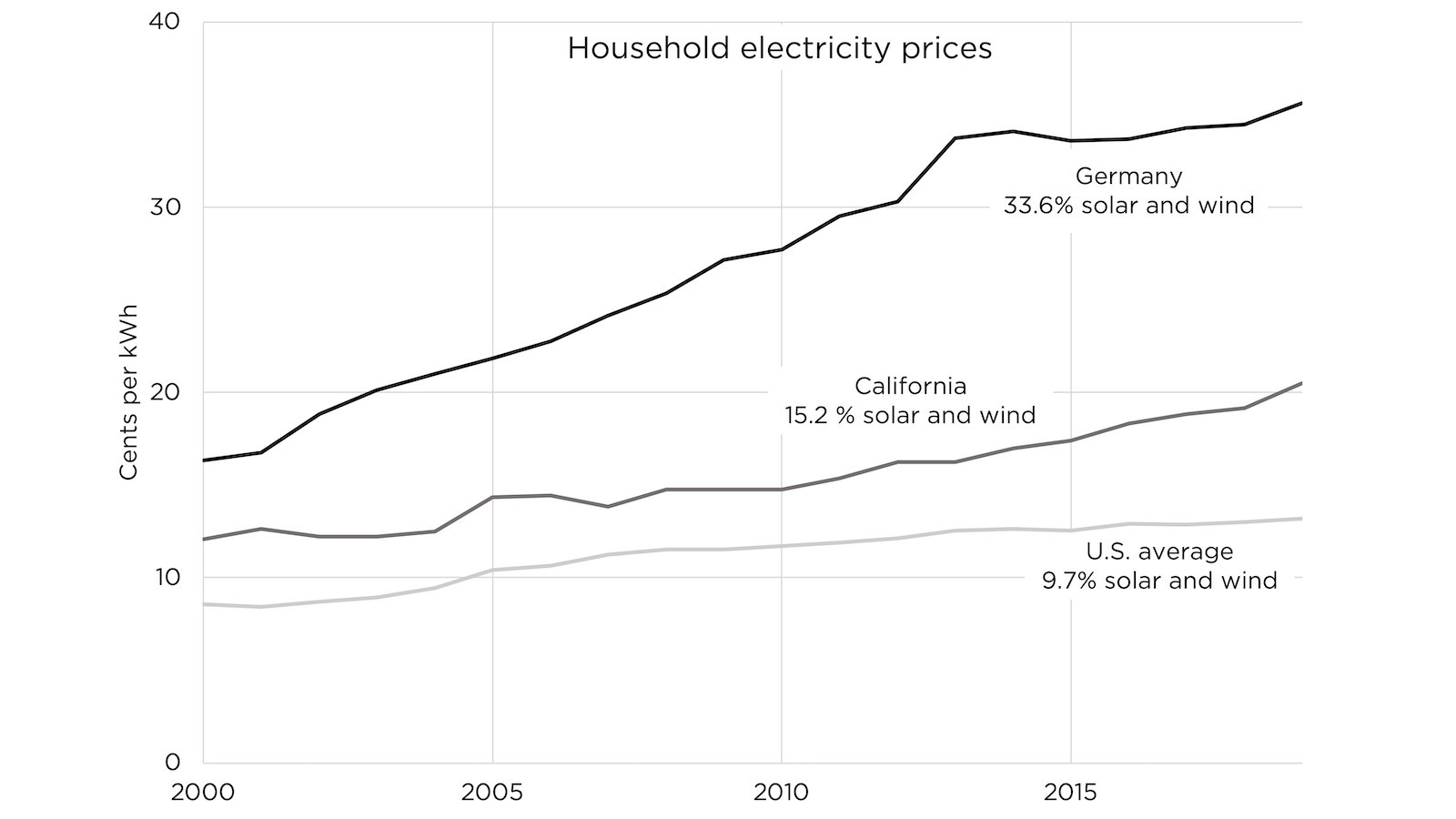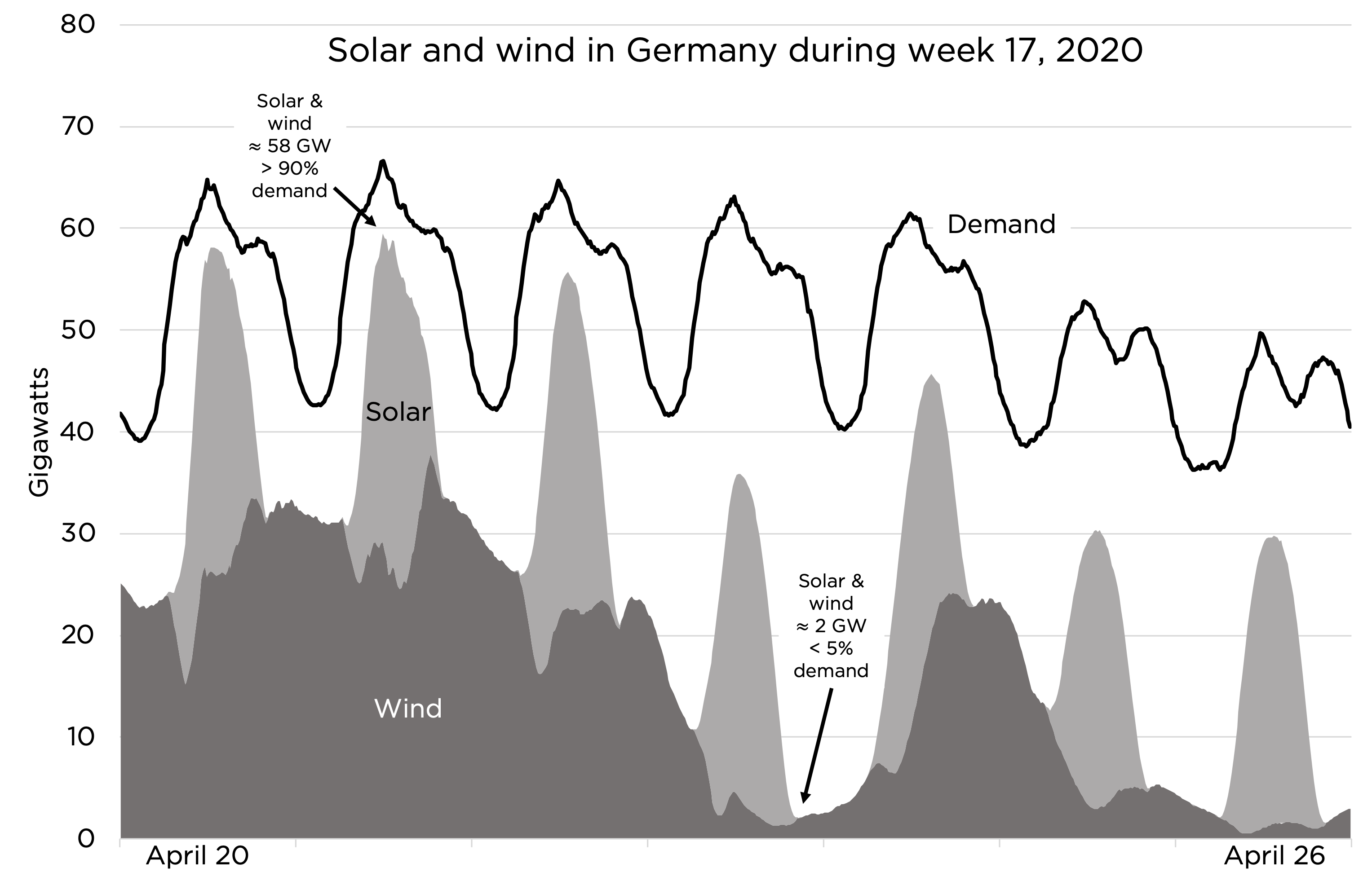The reconciliation bill's 10-year extension and increase of solar and wind subsidies will drive more and more reliable power plants off the grid, lead to skyrocketing prices and frequent blackouts.
Quick Summary
-
The reconciliation bill calls for a 10-year extension and increase of the Investment Tax Credit (ITC) subsidy for solar and the Production Tax Credit (PTC) subsidy for wind, which pay utilities to slow down or shut down reliable power plants whenever the sun shines or wind blows.1
-
Solar+wind cannot provide the reliable energy that our amazing electrical grid requires 24/7. That’s why every place in the world that uses unreliable solar+wind depends 24/7 on massive amounts of reliable energy from coal, gas, hydro, or nuclear plants.2
-
Because solar panels and wind turbines are unreliable they can’t replace our reliable power plants, only duplicate or supplement them at tremendous cost. That’s why the more solar+wind a grid uses the more expensive its electricity tends to be.

- Germans, to get 37% of their electricity from unreliable solar+wind, have doubled their prices--now 3X US prices. And they can only get away with 37% because they have neighbors to bail them out when solar/wind fall short. The US as a whole has no such neighbors.3

-
The only reason utilities buy unnecessary, wasteful solar panels and wind turbines is government policies that force them to do so or reward them for doing so.
“We get a tax credit if we build a lot of wind farms. That’s the only reason to build them.”--Warren Buffett.4
-
The two worst solar/wind policies today are the solar Investment Tax Credit (ITC) subsidy and the wind Production Tax Credit (PTC) subsidy, which pay utilities to shut down or slow down reliable gas, coal, and nuclear power plants whenever the sun shines or the wind blows.
-
By paying utilities to shut down or slow down reliable power plants whenever the sun shines or the wind blows, the ITC/PTC end up defunding reliable power plants, driving many out of operation and threatening the grid’s future.
-
ITC/PTC subsidies help solar+wind to win on distorted wholesale markets and are a major driver of premature retirement of CO2-free nuclear plants, as unreliable sources are allowed to produce erratically and then and force nuclear plants to pay for the cost of balancing the grid.
-
Congress needs to let the ITC/PTC subsidies expire, end all forms of energy favoritism, and let technologies compete on reliability and cost. That will reduce electricity prices, increase reliability, and increase innovation.
-
Instead of letting the disastrous ITC/PTC subsidies expire, the Biden reconciliation plan calls for increasing these subsidies and extending them for 10 more years! If this happens, say goodbye to nuclear power, and to any form of affordable, reliable power.
-
Anyone who cares about CO2 emissions must recognize that the only non-carbon energy source that has a chance of outcompeting fossil fuels is nuclear energy. The reconciliation bill's ITC/PTC extension undercuts existing nuclear and effectively prevents new nuclear.5
-
Summary: The reconciliation bill's goal of expanding the ITC/PTC subsidies will make power more expensive and less reliable, and further undermine nuclear energy. We must scrap this threat to American energy and create a bill to liberate American energy.
References
- House Committee on Ways & Means - Subtitle F - Infrastructure Financing and Community Development Section-by-Section Alex Epstein - Talking Points on Wind Production Tax Credit↩
- Our World in Data - France: Energy Country Profile Ontario Energy Board - Ontario’s System-Wide Electricity Supply Mix: 2020 Data Danish Energy Agency - Energy Statistics 2019↩
- Public generation of electricity was over 488 terawatt-hours in Germany for 2020, solar and wind combined generated over 37%. In 2002 they generated just over 3%.
Fraunhofer ISE energy-charts.de
German household electricity prices have more than doubled to over 0.3€ per kWh ($0.35 per kWh depending on currency exchange rate) since 2000 when the modern renewable energy law started to massively incentivize solar and wind capacity on the German grid.
BDEW Strompreisanalyse Jul 2021 p. 7
The average US household price in 2020 was $0.1315 per kWh.
U.S. Energy Information Administration Electric Power Annual table 5a
Increasingly, Germany depends on interconnections with neighboring countries. In 2020 the country experienced a sharp increase in electricity imports, while still massively exporting solar and wind overproduction.
Reuters - German power export surplus shrank 46.2% in 2020↩ - Warren Buffet cited by U.S. News/Nancy Pfotenhauer↩
- Alex Epstein - Talking Points on CO2 Emissions↩
